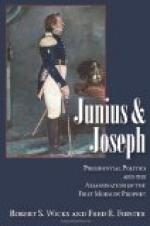“I was in the city all the time. The Government of Illinois sent to arrest Mr. Smith, but his people rallied round him, and said that in consequence of the lawless persecutions that had passed in Missouri they had a right to mistrust the justice of the State. They called out the Nauvoo Legion, and sent back the constables that had come from Carthage. That made the Gentiles terribly angry. The Illinois militiamen went about saying openly that they would burn down the town and kill every man, woman, and child in it. So then Governor Ford himself advised our prophet to keep the Legion under arms, for he said the Gentiles were so furious; but he asked the prophet to go to Carthage and pledge himself to appear for the trial when it came on, for it was a civil suit, and no harm could come to him and his. Governor Ford pledged his honour as the Governor of the State.
“I had been waiting about the town until the prophet should be less bothered before asking him to heal my sickness, but when I heard that he was going away, then I misdoubted that it would be long before he came back. I thought I’d make a push for it, so I went and hung round the door of the prophet’s house. I was only a poor man and I did not like to go in, for the bishops and elders and all the grand folks were going in and out all that day. I heard the things they said, and most of them were saying that the prophet had had a vision, and that if he went to Carthage he would never come back alive. They said too that if he stayed, the town would be sacked, and I understood that they were asking him to run away. Towards evening I saw a buggy draw up at the back door of the hotel, and all the elders seemed to be holding a meeting, for they were singing hymns; so then it just come to me that they were going to get the prophet off, and I ran down the road to the ferry, for I knew he would have to go that way. I waited in the boat, and the same buggy came down to it, and a man with a cloak on and his hat over his eyes came out and sat in the corner of the boat, and we all knew that it was the prophet, and none of us durst speak to him. But I went over in the boat, for I hoped I’d get up courage to ask him when we came to the other side. When he stood on the shore he seemed like a man that didn’t know what to do, although there was horses there for him to take, and he turned round and went off the road up on to a little hill; and I went after him a bit of the way behind, and I came and found him just standing looking at the city, for the river swept round two sides of it so noble like, and blue as the sky above, and the city stood all white, and the temple stood high in the middle, and all of it glistened in the sun. The prophet had taken off his hat, and he stood with his hands folded on the stick he carried, and he just looked and looked at the city. I had never seen a man look like that but once before, and then it was a man I knew whose wife died, and he looked at her face just steadfast like that. I couldn’t think to speak to him about myself just then, although I’d got him alone, for my heart was just broke to see how sad he looked, and him just in the prime of life; for it was his own city, and the sound of all its work came over to us as we stood there, and the thousands and thousands of happy homes in it belonged to his own people.




